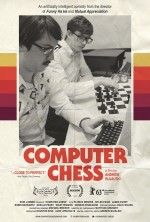Computer Chess

From across the land they come, the nerds, the geeks, the professionals, and the hobbyists. The computer programmers and the computer deriders, the chess pros and the chess amateurs, all seeking the answer to that age-old question: can you teach a computer to play that game of chess?
A word of warning right from the outset: this movie is not for everyone. In fact, it might not be for anyone; it’s still unclear. But, flying in the face of all conventional wisdom on storytelling, it’s still magnificent, with or without an audience.
Against the backdrop of the development of the chess computer in the early 1980s, writer-director Andrew Bujalski (Funny Ha Ha) has fashioned a story about the old sci-fi question of “what does it mean for computers to learn to think?” into an entirely original experience. This is original in every sense of the word; there is really no other word to describe Computer Chess.
The movie is filmed in black and white video, as if it were a local news channel documentary covering a tiny, particularly boring event, which gives it a very realistic feel. That feeling is helped along by a cast of mostly non-actors who work in similar fields to their characters, bringing a sense of reality to every word they say despite the unreality of the world they are in.
You might even think it’s a documentary, until the camera starts going into other people’s rooms and spending the night with the strange ensemble of programmers as they talk about where their work will lead. Is it being used as a testing ground for the Pentagon to build programs to run missiles with? Is it worthwhile to make a computer that can beat a person at chess? Would such a computer be able to think the way a person does?
Believe it or not, none of those questions really matter, at least not to Bujalski. Buried within his computer competition narrative is a much richer, more complex view of the world, asking far more potent questions about what it means to connect with another human being, and if it is even possible.
As the competition unfolds, in true sports-movie fashion, nothing goes as planned for anyone. The leading contender team from Caltech is falling apart and programmer Peter (Patrick Reister) is desperate to know why his computer prefers playing real people to other computers. The only person who seems a match for boring but effective Les (James Curry) is the iconoclastic Papageorge (Myles Page), who might be able to win the whole thing if he could get over the fact he has no room and nowhere to sleep or prepare and is left each night roaming the convention hotel with no company except the horde of cats who seem to fill every empty room. And then it gets weird.
The only downside to this film is the intentional amateurism. While Bujalski seems to want a visual experience that will work hand-in-hand with the world he is building, it’s sometimes too clumsy for its own good and ultimately distracting from the world he has created.
And when it’s a world as strange as this one — complete with a sexual therapy group in the basement that reenacts the moment of its members births — grounding at some level is called for. Some of those techniques, like the few moments of color film photography dissolving as if the camera ran out of film, are clearly intentional. Others, like dollies running into walls, less so.
Despite those problems, there is a really great film inside Computer Chess that is hard to ignore. Jokes that don’t seem like they should land are hysterical, and questions of human nature that seem too abstract to be emotionally significant hit you square in the face. Sure, it’s ultimately a cerebral movie, but it’s a good one.
And it raises an old, unsolved philosophical conundrum — if a film plays in a theater, and there’s no one to see it, does it still exist? Yes, it does, and even if no one ever watches it, Computer Chess is a true original.
Cast: Patrick Riester as Peter Bishton; Wiley Wiggins as Martin Beuscher; Myles Paige as Michael Papageorge; Robin Schwartz as Shelly Flintic; Gerald Peary as Pat Henderson; Gordon Kindlmann as Tom Schoesser; James Curry as Les Carbray; Jim Lewis as John; Chris Doubek as Dave; Cyndi Williams as Pauline; Tishuan Scott as Keneiloe.



Leave a Reply